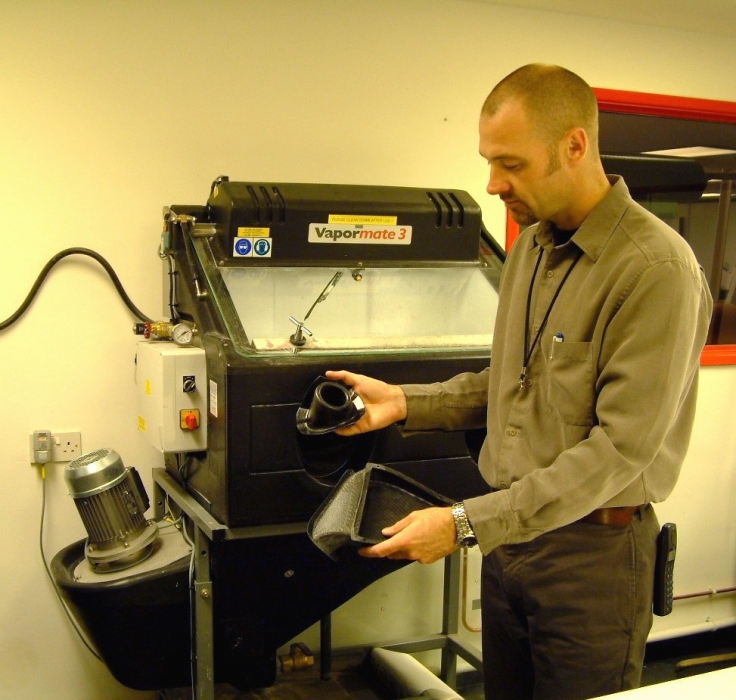RTN (Racing Technology Norfolk) has installed the latest ‘Vapormate 3’ wet abrasive blast cabinet from Vapormatt, for the surface treatment of composite and aluminium structural components used at the leading edge of motor racing technology. RTN, based at Hingham near Norwich, is a wholly owned subsidiary of Audi AG and has worked closely over the last few years with Le Mans 24-hour racing teams. The company also provides specialist research and development, design and prototyping services for the VW Group.
Manually operated, the Vapormate machine is used largely for the precise surface etching of the latest composite bodywork and structural materials (carbon fibre and ‘Kevlar®’, for example) prior to adhesive bonding. This is an area in which Vapormatt has pioneered the use and development of wet blasting technology. The machine is also employed for the degreasing and surface finishing of aluminium and special alloy structural parts. The fact that the machine offers this dual function has proved of major benefit.
Composite materials are notoriously difficult to bond, due to the presence of resinous material on the normally smooth, non-retentive surface. Grease or dust on the surface can further compromise effective adhesion. Vapormatt’s wet blasting process has been found to create more consistent cleaning and pre-bond surface abrasion than other forms of surface preparation, leading to more reliable and stronger adhesion between the bonded elements of composite fabrications. This is obviously of vital importance in the racing and performance car sector.
The ‘Vapormate’ process employs a patented slurry/air pumping system, which applies a very fine water-borne abrasive mix containing a special cleaning fluid under controllable pressure. This action surgically cleans and simultaneously keys composite surfaces without damaging fibres or the “lay-up” of the material. The use of a wet abrasive process also eliminates static build-up, prevents the impregnation of hard particles into the soft composite resin surface and continually washes the component.
Added to this, Graham Muff, Composites Manager at RTN, says that he has found wet blast media to have a longer working life than media used in alternative dry abrasive blasting systems, also producing a more reliable and predictable result.
The process technology was originally developed by Vapormatt for composites used in aerospace structural applications and has progressed naturally into the motor sport and even the production car sectors, in parallel with the constant demand to increase strength-to-weight ratios and optimise vehicle performance.
When used with metal parts, the wet blasting process provides effective degreasing and surface preparation or fine finishing in a single operation - saving time and avoiding the need to employ additional cleaning or degreasing systems.























